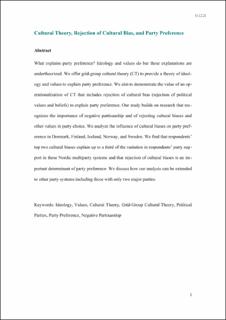| dc.contributor.author | Olli, Eero Vebjørn | |
| dc.contributor.author | Swedlow, Brendon | |
| dc.date.accessioned | 2023-04-18T06:40:09Z | |
| dc.date.available | 2023-04-18T06:40:09Z | |
| dc.date.created | 2022-05-25T10:16:14Z | |
| dc.date.issued | 2023 | |
| dc.identifier.issn | 1354-0688 | |
| dc.identifier.uri | https://hdl.handle.net/11250/3063444 | |
| dc.description.abstract | What explains party preference? Ideology and values do but these explanations are undertheorized. We offer grid-group cultural theory (CT) to provide a theory of ideology and values to explain party preference. We aim to demonstrate the value of an operationalization of CT that includes rejection of cultural bias (rejection of political values and beliefs) to explain party preference. Our study builds on research that recognizes the importance of negative partisanship and of rejecting cultural biases and other values in party choice. We analyze the influence of cultural biases on party preference in Denmark, Finland, Iceland, Norway, and Sweden. We find that respondents’ top two cultural biases explain up to a third of the variation in respondents’ party support in these Nordic multi-party systems and that rejection of cultural biases is an important determinant of party preference. We discuss how our analysis can be extended to other party systems including those with only two major parties. | en_US |
| dc.language.iso | eng | en_US |
| dc.publisher | Sage | en_US |
| dc.title | Cultural theory, rejection of cultural bias, and party preference | en_US |
| dc.type | Journal article | en_US |
| dc.type | Peer reviewed | en_US |
| dc.description.version | acceptedVersion | en_US |
| dc.rights.holder | Copyright 2022 The Author(s) | en_US |
| cristin.ispublished | true | |
| cristin.fulltext | postprint | |
| cristin.qualitycode | 2 | |
| dc.identifier.doi | 10.1177/13540688211071065 | |
| dc.identifier.cristin | 2027228 | |
| dc.source.journal | Party Politics | en_US |
| dc.source.pagenumber | 359–373 | en_US |
| dc.identifier.citation | Party Politics. 2023, 29 (2), 359–373. | en_US |
| dc.source.volume | 29 | en_US |
| dc.source.issue | 2 | en_US |
